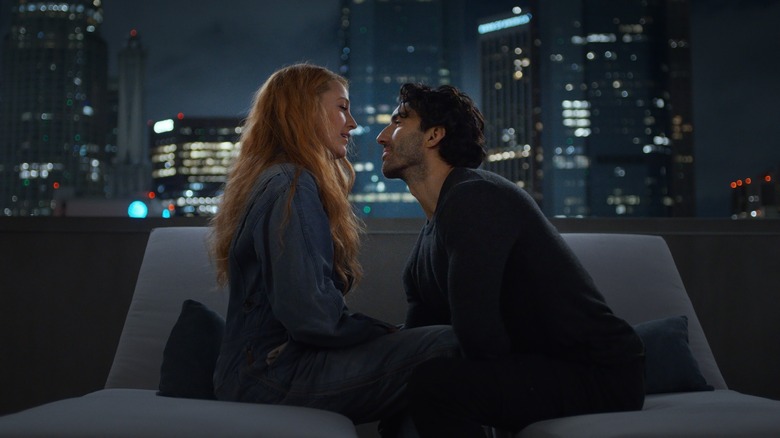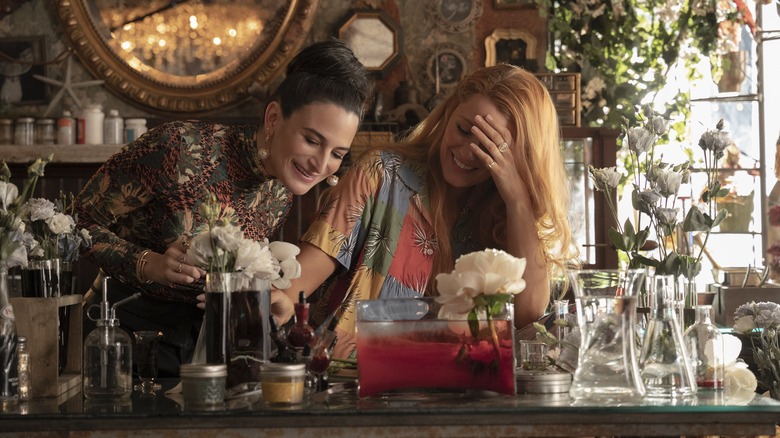Blake Lively's It Ends With Us Movie Has Rotten Tomatoes Critics United
Only a few weeks after "Deadpool & Wolverine" supercharged the box office, perhaps it was fate that the first real rival to the Ryan Reynolds-led superhero movie would come in the form of a romantic drama starring Blake Lively, both of whom are married to one another and are undoubtedly, as the kids say, goals. (Lively even scores multiple fourth wall-breaking references in her husband's threequel and her own cameo voice appearance as well.) "It Ends With Us" might not seem like a conventional challenger to potentially knock off one of the most highly-anticipated blockbusters in years from the number one spot, but that would be underselling the sheer expectations the film comes with, based on the bestselling novel by author Colleen Hoover.
The story follows recent college graduate Lily Blossom Bloom (Lively), who has aspirations of opening her own floral shop and meeting the perfect guy. When she crosses paths with neurosurgeon Ryle Kincaid (Justin Baldoni, who also directs) and embarks on a torrid romance, all appears to be straight out of, well, a romance novel ... until his darker side emerges and Lily is forced to reckon with the cycles of abuse she's only recently found out her own parents suffered from throughout their rocky marriage.
With all this hype and pressure leading up to the release of the first big screen adaptation, all eyes turned towards the reviews — and the results are, at best, mixed. /Film's own BJ Colangelo gave the effort a 4 out of 10 in her review, lauding Lively's "committed" performance and the good intentions in attempting to depict a realistic portrayal of domestic abuse. Unfortunately, its inherent reliance on dated tropes and penchant for becoming an "emotionally manipulative watch" end up sinking it. Here's what other critics had to say on the matter.
Tropes, red flags, and generational trauma abound in It Ends With Us
For as popular as the original novel may have become over the years since its publication, how good can an adaptation be when it's built on such shaky ground? That seems to be the consensus among many of the critics who came away from "It End With Us" with a nagging sense that this particular narrative can't escape the shadow of the source material.
Even in an overall positive review (albeit only 2.5 stars out of 4), The Washington Post's Amy Nicholson notes that the film "is an unwieldy yet compelling fusion of glittery fantasy and traumatic introspection," calling attention to the fact that it's frequently "prone to tonal whiplash." In Marya E. Gates' equally-scored review for Robert Ebert, the critic lays out how, "Lively does her best to add emotional layers to Lily so we see her internal growth, but this process is often hampered by the film around her" — a problem stemming from how Lily's character is oftentimes not given "interiority" beyond her trauma. For Esther Zuckerman of Rolling Stone, the tonal issue comes up again, though she goes out of her way to praise the movie's throwback feel to an earlier model of filmmaking: "The result is a mix of tones that doesn't always work, but often feels like a throwback to a different era of movie-making, one where the mid-budget movie willing to delve into issues was a viable business model."
One of the harsher reviews comes courtesy of Anna McKibbin from Little White Lies, who points out how the film shares many of the same shortcomings of the book and calls it a "meandering, shallow examination of domestic abuse."
It Ends With Us might win you over, despite its flaws
For some, however, the broad range of tones and the flashback structure of "It Ends With Us" helps the adaptation overcome some of its more melodramatic inclinations. Robert Daniels of Screen International states in his review that, "This is a film that leans into its cliches –- long, loving nights transform into windswept mornings, ardent dialogue teases obsession –- and smartly uses them to enact triggering lessons about generational trauma." Over at IGN, critic Lena Wilson similarly pulls no punches in her 7/10 review regarding the "occasionally schlocky and saccharine novel," but "an ace script and stellar performances" help it rise above any of author Colleen Hoover's less successful proclivities. Meanwhile, Owen Gleiberman writes in his review for Variety that "It Ends With Us" is "an avid and emotional movie that pulls you right along." In fact, he goes even further and suggests that it might actually help going into this film knowing nothing about what it's about, preserving its twists and turns.
Elsewhere, many are quick to indicate that Baldoni can't quite pull off every aspect of this tonal juggling act. In Proma Khosla's review for IndieWire, the critic ultimately comes to the conclusion that the film "manages to sensitively handle its delicate subject matter, though largely at the cost of a more intricate narrative." Lovia Gyarkye of The Hollywood Reporter puts an even finer point on it, drawing attention to screenwriter Christy Hall's tendency to add a metatextual streak. The movie apparently "makes an effort with some early winking jokes that acknowledge the novel's clichés. But the adaptation can't be saved from the contrivance baked into the original text."
Fans will get their chance to decide for themselves when "It Ends With Us" comes to theaters on August 9, 2024.


